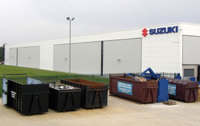Big strides towards a smaller carbon footprint
 A pioneering environmental strategy is reaping green rewards for Suzuki GB at its Milton Keynes headquarters, cutting waste, saving energy and shrinking the business’s carbon footprint.
A pioneering environmental strategy is reaping green rewards for Suzuki GB at its Milton Keynes headquarters, cutting waste, saving energy and shrinking the business’s carbon footprint.Launched in May, the programme has already achieved remarkable results, with thorough sorting of all waste on site drastically cutting the amount being sent to landfill, which in turn means a significant reduction in vehicle movements on local roads.
The site at Snelshall West is home to Suzuki GB’s administration and parts distribution warehouse operations for the UK and Ireland, covering its car, motorcycle, all-terrain vehicle and marine engine businesses. The warehouse opened in 2005 with office and workshop operations moving on site from the previous premises in Sussex later that year. The workforce of more than 150 is drawn largely from within a 27-mile radius.
Ian Kirsop, Facilities Manager, explained: “The staff here have been inspired by the scheme and are giving it great support. The approach is fully in line with Suzuki’s wider aims as an international business and we are setting an example of best practice that our colleagues in Europe can follow.
“We looked at the number of lorry movements on and off the site and found that a large number were just shifting our waste. Thanks to the new system we have put in place, non recyclable waste has been greatly reduced to just one load every seven weeks or so.”
Even though the scheme has only recently been introduced, the predictions are for big savings within the first year. Key indicators for 2008 include:
General, non-recyclable waste reduced by more than 50 per cent, from 78.8 to 30.1 tonnes
100 per cent recycling of cardboard and metal waste with wood recycled for animal bedding
Total waste disposed of cut from 233.3 to 80.3 tonnes
To achieve its aims, Suzuki recruited help from locally-based professionals, MT Waste Management. Together they have established a co-ordinated waste sorting system that covers the entire operation – offices, workshops and warehouse – overseen by an on-site manager.
Waste is sorted at the point of use, so cardboard, light metal, aluminium, rubber, wood and other recyclable items are segregated from non-recyclables. At a central collecting point, suitable waste is broken down, compressed and baled to ensure the most efficient use of transport space. And the bonus for Suzuki is that it earns money from every load of recyclable material, to the extent that the waste management scheme should be a profit-making part of the business within the next few years.
Recycling is one element in a wider environmental plan that has been applied to all aspects of the business. Plastic cups are recycled, sensors ensure electric lighting doesn’t blaze in empty rooms, air conditioning levels and timing have been optimised to match working hours and the warehouse conveyor system is split into sections with load sensors, so that power is only used when it detects items to be moved. The predicted effects of the strategy should see electricity usage cut by more than 45 kilowatt hours by 2010.

